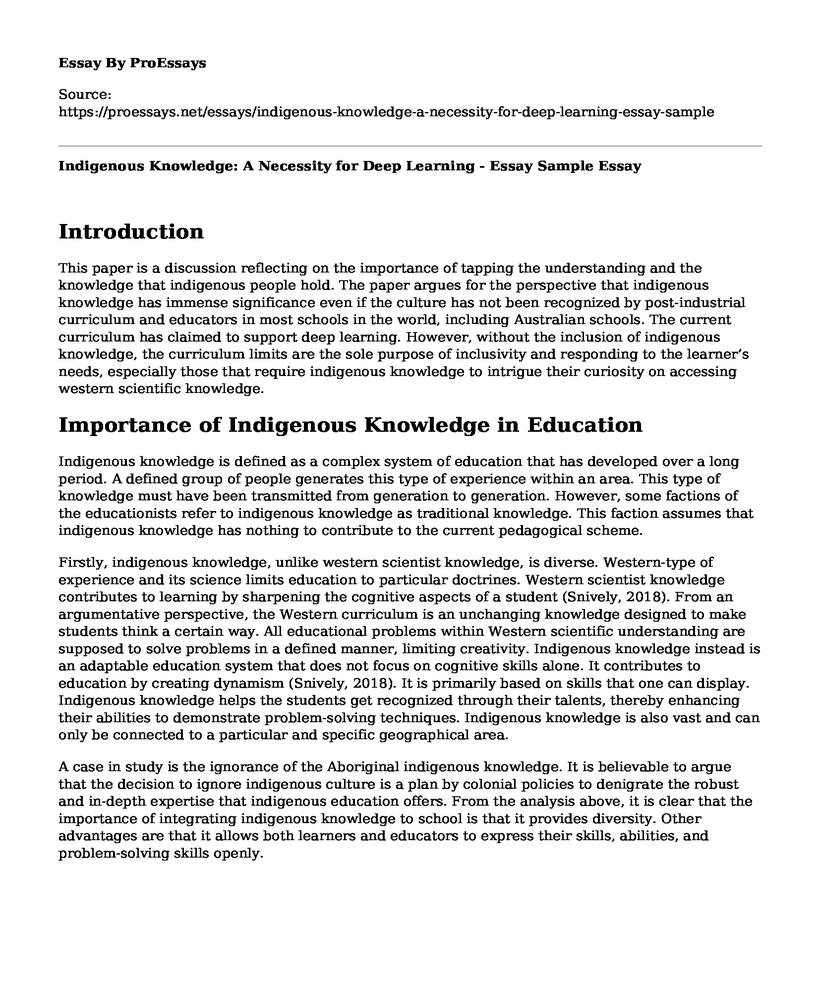Introduction
This paper is a discussion reflecting on the importance of tapping the understanding and the knowledge that indigenous people hold. The paper argues for the perspective that indigenous knowledge has immense significance even if the culture has not been recognized by post-industrial curriculum and educators in most schools in the world, including Australian schools. The current curriculum has claimed to support deep learning. However, without the inclusion of indigenous knowledge, the curriculum limits are the sole purpose of inclusivity and responding to the learner’s needs, especially those that require indigenous knowledge to intrigue their curiosity on accessing western scientific knowledge.
Importance of Indigenous Knowledge in Education
Indigenous knowledge is defined as a complex system of education that has developed over a long period. A defined group of people generates this type of experience within an area. This type of knowledge must have been transmitted from generation to generation. However, some factions of the educationists refer to indigenous knowledge as traditional knowledge. This faction assumes that indigenous knowledge has nothing to contribute to the current pedagogical scheme.
Firstly, indigenous knowledge, unlike western scientist knowledge, is diverse. Western-type of experience and its science limits education to particular doctrines. Western scientist knowledge contributes to learning by sharpening the cognitive aspects of a student (Snively, 2018). From an argumentative perspective, the Western curriculum is an unchanging knowledge designed to make students think a certain way. All educational problems within Western scientific understanding are supposed to solve problems in a defined manner, limiting creativity. Indigenous knowledge instead is an adaptable education system that does not focus on cognitive skills alone. It contributes to education by creating dynamism (Snively, 2018). It is primarily based on skills that one can display. Indigenous knowledge helps the students get recognized through their talents, thereby enhancing their abilities to demonstrate problem-solving techniques. Indigenous knowledge is also vast and can only be connected to a particular and specific geographical area.
A case in study is the ignorance of the Aboriginal indigenous knowledge. It is believable to argue that the decision to ignore indigenous culture is a plan by colonial policies to denigrate the robust and in-depth expertise that indigenous education offers. From the analysis above, it is clear that the importance of integrating indigenous knowledge to school is that it provides diversity. Other advantages are that it allows both learners and educators to express their skills, abilities, and problem-solving skills openly.
How Does Not Integrating Indigenous Knowledge in Education Impact Indigenous Peoples and Non-Indigenous Peoples
Not integrating indigenous education in the curriculum causes a lot of harm to students. To indigenous students, it limits their access to elements of who they are. For indigenous people failing to integrate indigenous knowledge into the curriculum is allowing them to learn another people’s culture. So they have nothing to reflect and relate to by themselves. According to the pedagogical theory of Jean Piaget, reflection and heritage is often a necessary condition for the success of many indigenous learners (Snively, 2018). Failing to integrate indigenous education within the curriculum is denying the Aboriginals in Australia the opportunity to reflect and learn.
For the non-indigenous people, the failure to integrate indigenous knowledge in the curriculum limits their ability to develop understandings that can help bridge the gap between them and the indigenous people in the same community (Snively, 2018). Non-indigenous people can now use integrated aboriginal education to bridge the gap and learn the good about the indigenous culture.
Conclusion
In conclusion, integrating the traditional indigenous perspectives of teaching and learning within the education system is an immense chance for creating an accommodative and responsive education system that satisfies the need for all students.
Reference
Snively, G. (2018). –Braiding Indigenous Science with Western Science. Knowing Home: Braiding Indigenous Science with Western Science, Book 2. https://ecampusontario.pressbooks.pub/knowinghome/chapter/chapter-1/
Cite this page
Indigenous Knowledge: A Necessity for Deep Learning - Essay Sample. (2023, Aug 14). Retrieved from https://proessays.net/essays/indigenous-knowledge-a-necessity-for-deep-learning-essay-sample
If you are the original author of this essay and no longer wish to have it published on the ProEssays website, please click below to request its removal:
- Student Motivation and Instant Access to Information Online
- Professional Early Chilhood Educators Essay Example
- Critical Viewpoints Essay Example
- Under-Five Mortality: Impact on Child Growth - Research Paper
- Paper Example on Universities Uphold Environmental Sustainability: ACUPCC's Commitment to Climate Change
- Free Research Paper Sample on Child Development: Mastering Skills & Gaining Knowledge
- Paper Example: Nature vs. Nurture on Child's Development







